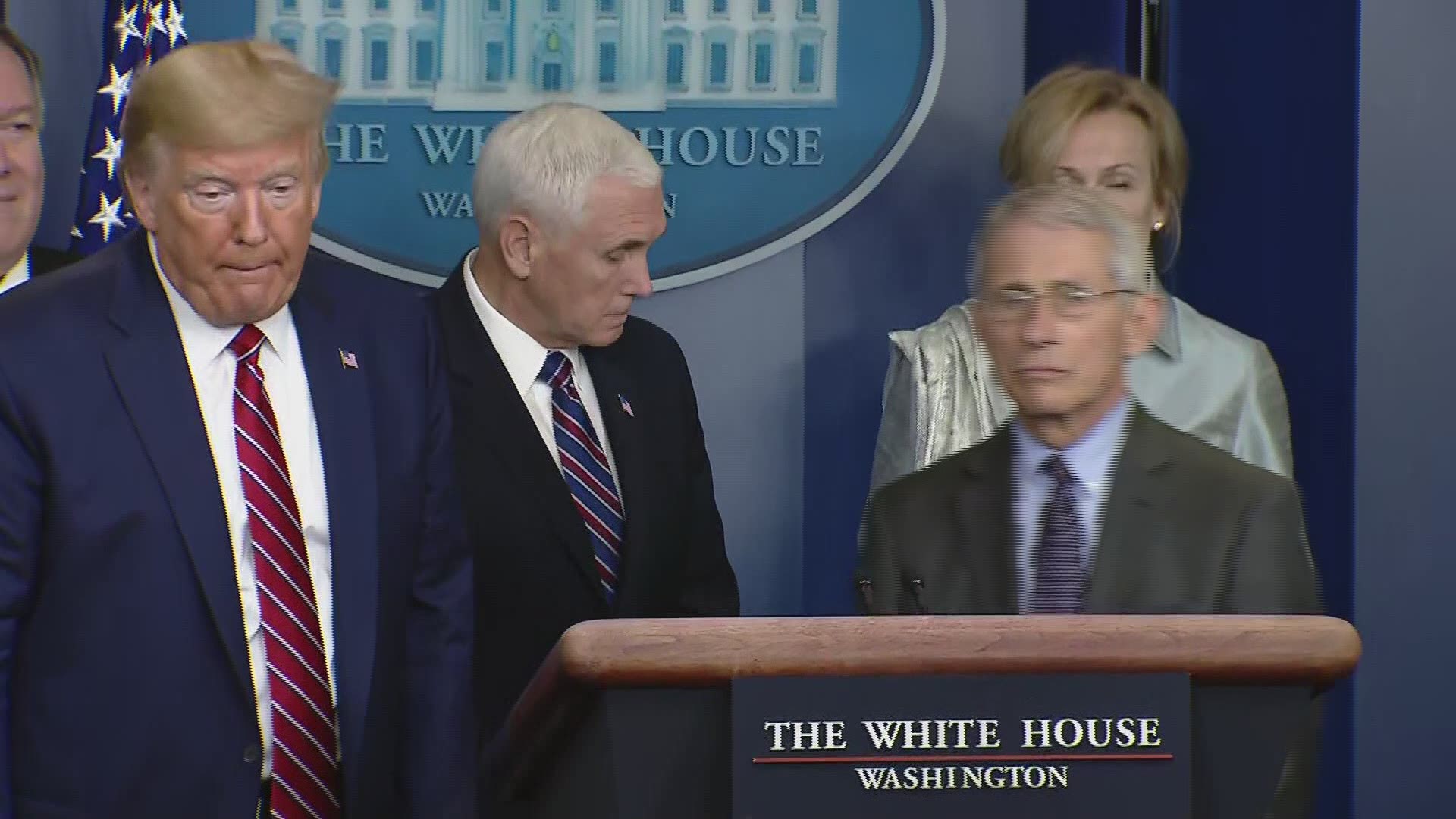WASHINGTON — While President Donald Trump has suggested multiple times over the past 24 hours that two antimalarial drugs could be the key to the effort to stop coronavirus, doctors – including a member of his own coronavirus task force – are urging the public to have lower expectations.
On Thursday, Trump said during a press conference that the FDA had approved two drugs, chloroquine and hydroxychloroquine, for treatment of coronavirus patients. The head of the FDA clarified a short time later that the drugs were only being approved for “compassionate use” – meaning use by patients in dire situations or for whom no other treatment is available.
On Friday, Trump again suggested the drugs could see widespread use, saying they could be a “game changer” and downplaying statements by Dr. Anthony Fauci – the director of the National Institute of Allergy and Infectious Diseases and a member of the White House Coronavirus Task Force – that chloroquine and hydroxychloroquine were unlikely to be magic bullets.
“It may work, it may not work. I feel good about it,” Trump said. “That’s all it is. Just a feeling. You know, I’m a smart guy. I feel good about it.”
Trump’s comments came moments after Fauci gave a blunt answer to a reporter’s question about whether the antimalarials were intended to be used for prophylaxis – or prevention – of coronavirus.
“The answer is no,” Fauci said. “So as the commissioner of FDA and the President mentioned yesterday, we’re trying to strike a balance between making something with a potential of an effect to the American people available, but at the same time that we do it under the auspices of a protocol that would give us the information to determine if it’s truly safe and truly effective.”
Watch: Dr. Anthony Fauci talks about using chloroquine as a treatment for coronavirus
Neither chloroquine nor hydroxychloroquine are new drugs. According to Dr. Remington Nevin, a physician and former U.S. Army public health officer, both were developed around the time of WWII to replace the antimalarial that was in extensive use at the time, quinacrine (trade name Atabrine).
“It was thought that these two drugs did not share the same neuropsychiatric adverse effect profile that plagued quinacrine or Atabrine, but we know that both drugs do cause adverse neuropsychiatric effects, including changes in mood, sleep, cognition, as well as neurologic problems such as tinnitus, vertigo and hearing impairment,” Nevin said.
Nevin is the executive director of the Quinism Foundation, a non-profit which works to raise awareness about the dangers of quinoline antimalarial medications. WUSA9 has done extensive reporting on one of those drugs – mefloquine – which is part of the same family of quinoline drugs as chloroquine and hydroxychloroquine.
RELATED: INVESTIGATION: Vets say anti-malaria drugs they were ordered to take caused devastating side effects
“The president’s interest, I think, is looking for some sort of silver bullet or miracle cure,” Nevin said. “And this appears, seemingly, to fit the bill. And undoubtedly, the drugs have effective antiviral properties. Very likely we’ll see that confirmed clinically. But that’s not the question. The real question is: What are the dangers? And what are the risks? Particularly given the enthusiasm and the urgency, I’m very concerned that the risks of this drug will not be adequately considered in our zeal to see them deployed.”
Military veterans and former Peace Corps volunteers who were prescribed quinoline antimalarials, mefloqune specifically, while serving abroad have told WUSA9 about the life-altering side-effects the drugs have had on them, including paranoia, intense nightmares, and suicidal and homicidal ideation.
Nevin stressed that chloroquine and hydroxychloroquine are often well-tolerated – in fact, he said, chloroquine is mostly used in the U.S. now for off-label treatment of rheumatoid arthritis. But, for those patients who do have adverse reactions, Nevin said, the side effects could be far worse than the symptoms of the coronavirus they’re taking the drug to prevent.
“There are two very different scenarios that need to be considered separately,” Nevin said. “The first is use of this drug for treatment of acute, life-threatening illness. Even the drug’s most ardent critics, including myself, would be hard-pressed to criticize use of the drug in a life-threatening situation. But this is not what the drugs are going to be used for, for the most part. If these drugs are approved, they will most likely be used for treatment of mild, non-life-threatening illness and prevention – including prevention among low-risk individuals. So we know that this disease, COVID-19, poses very little risk to people under the age of 50. So individuals who are taking these drugs at the onset of symptoms will be incurring potentially significant risk, while deriving potentially very little to no benefit at all. And this is the situation that we hope will lead to further thought and consideration.”
Nevin said he’s worried the pressure on the federal government to do something about the coronavirus will lead the FDA to move too fast in approving these drugs for an unproven use. He says he’s also worried about large numbers of people taking these drugs without being under direct medical supervision.
“I have been inundated by phone calls, tweets and emails from individuals who heard the possibility that these drugs may be effective, wanting to acquire supplies outside of the traditional medical or pharmacy channels,” Nevin said. “This is, I think, very dangerous. While these studies are underway and while the drugs are being considered to be licensed for this new indication, I think it’s important that public health officials emphasize these drugs should not be used by members of the public without supervision.”
RELATED: Retired Army General calls on VA leaders to take responsibility for anti-malaria drug side effects
----
Jordan Fischer is an investigative reporter with WUSA9. Follow him on Twitter at @JordanOnRecord.

